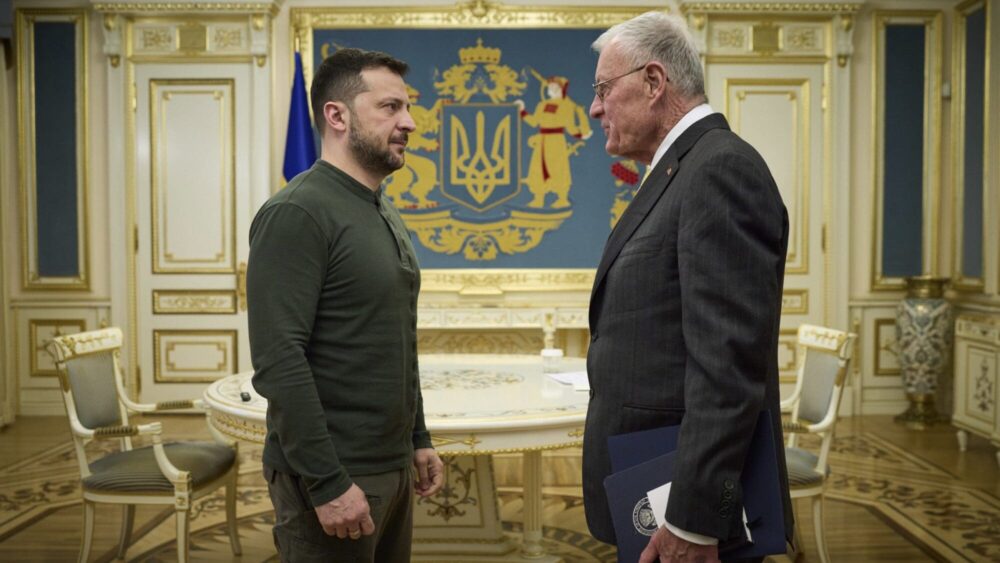
Ukrainian President Volodymyr Zelensky said that his negotiations on Thursday, February 20th, with U.S. President Donald Trump’s special envoy was a meeting “that restores hope.”
With General Kellogg, we discussed the frontline situation, the need to free all our prisoners of war held in Russia, and the necessity of a clear, reliable system of security guarantees—one that ensures this war never returns and that Russia never destroys lives again,” Zelensky said.
A day of intense international work. My meeting with General Kellogg was one that restores hope, and we need strong agreements with the U.S.—agreements that will truly work. I have instructed my team to work quickly and very sensibly.
— Volodymyr Zelenskyy / Володимир Зеленський (@ZelenskyyUa) February 20, 2025
Economy and security must always go hand in… pic.twitter.com/N5k2bu13qk
His words signaled that he might be willing to accept a deal by Trump on access to minerals in exchange for security guarantees for Ukraine.
Zelensky and Trump had publicly insulted each other in recent days following a meeting between U.S. and Russian diplomats in Saudi Arabia on Tuesday—intended to restart a dialogue between the two global powers while seeking an end to the war in Ukraine.
Zelensky accused Trump of helping Russian President Vladimir Putin escape international isolation and said the U.S. President was trapped in a Russian “disinformation” bubble. Trump then named Zelensky a “dictator,” pointing to the fact that the Ukrainian president’s mandate ended last year but stayed in power based on the argument that elections cannot be held in wartime.
After meeting Keith Kellogg on Thursday, Zelensky, while positive about the talks, said Ukraine needed strong agreements with the U.S., and that “economy and security must always go hand in hand.” A planned press conference following the meeting was, however, canceled, reportedly at the request of the U.S.
Washington has proposed a deal to Kyiv that would give the United States access to vast amounts of Ukrainian natural resources. Trump’s National Security Advisor Mike Waltz said it was “the best security guarantee they could ever hope for,” because it would see the U.S. invested in the country.
The new U.S. administration is unwilling to continue aiding Ukraine militarily and wants a peace deal as soon as possible—this is a U-turn on the Biden administration’s strategy, which was willing to fund Ukraine endlessly, without opening the channels of dialogue with Moscow.
However, the reality on the battlefield is that Russian troops are making slow but steady advances in the southeastern territories of Ukraine. Russia has occupied about a fifth of Ukraine’s territory since annexing Crimea in 2014 and invading the rest of the country three years ago.
U.S. Secretary of State Marco Rubio said that although he was “not a fan of most of what Vladimir Putin has done,” the U.S. has to talk
to a nation that has, in some cases, the largest tactical nuclear weapons stockpile in the world, and the second largest, if not the largest, strategic nuclear weapons stockpile in the world.
The United States’ European allies have so far been sidelined by Washington in its attempts to bring about a peace deal. This is understandable as Europe has failed to come up with a strategy to deal with the war in the past three years, with its thinking narrowed down to funding Ukraine for as long as it takes.
A hastily summoned meeting of European leaders this week once again highlighted this lack of strategy as well as the disunity among member states. Some leaders have pledged to step up spending on defence and some are considering a U.S.-backed European peacekeeping force for the country.
Mike Waltz reacted to European leaders’ criticism of the U.S., saying
This is a common-sense plan. They may not like it but we’re going to drive it forward and everybody will stop squawking when the fighting ends.
